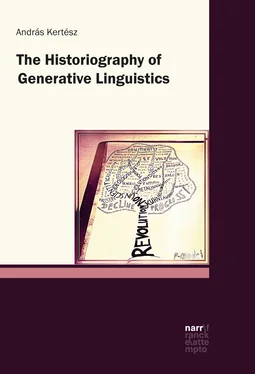| (T16) |
Government-BindingGovernment and Binding, Theory of Theory (the Theory of Principles and Parameters)Principles and Parameters, Theory of led to a KuhnianKuhnian revolution.evolutionrevolutionKuhnian |
Thus the solution of (P) is:
| (SP16) |
The basic terms of the historiographyhistoriography of generative linguistics are ›revolution‹ and ›paradigm‹paradigm with respect to the Theory of Government and BindingGovernment and Binding, Theory of (Principles and Parameters), its central hypothesis is (T16) and its framework is KuhnKuhn, Thomas S. (1970) [1962]. |
However, it is not the above references that make (SP16) really interesting, but the debate that was initiated by LappinLappin, Shalom et al. (2000a) in the journal Natural Language and Linguistic Theory , because it raised the issue of the revolutionaryrevolutionary nature of the Theory of Government and BindingGovernment and Binding, Theory of in comparison to the Minimalist ProgramMinimalist Program. Therefore, we will summarize the essence of this debate when discussing the Minimalist Program in Section 2.5.2.2.
2.4.1.2 KuhnianKuhnian revolutionrevolutionKuhnian without paradigmparadigm replacement
KornmesserKornmesser, Stephan’s (2014a), (2014b) approach is unique in that although the author makes use of the KuhnianKuhnian terms ›scientificscientific revolutionrevolutionscientific‹ and ›paradigmparadigm‹, he does not claim that the Theory of Principles and ParametersPrinciples and Parameters, Theory of is revolutionaryrevolutionary relative to previous stages of generative linguistics or the neo-Bloomfieldianneo-BloomfieldianBloomfieldian school; rather, he argues that it is revolutionary with respect to another trend which coexists with it, namely, Construction GrammarConstruction Grammar.1
KornmesserKornmesser, Stephan’s line of argumentation starts with the reconstruction of the standard interpretation of KuhnKuhn, Thomas S.’s view of the relationship between scientificscientific revolutionrevolutionscientific and paradigmparadigm change. The standard interpretation says that »[i]f a scientific revolution takes place between an old paradigm P 1and a new paradigm P 2, then P 1is replaced by P 2.« (Kornmesser 2014a: 91). As opposed to this, by analyzing Kuhn’s work, Kornmesser argues that there are scientific revolutions in the KuhnianKuhnian sense without paradigm change. In order to avoid that his claim, according to which there are scientific revolutions without paradigm replacement, turns out to be false or requires a different understanding of the term ›scientific revolution‹ from Kuhn’s, he tries to show that, contrary to common belief, Kuhn’s original idea of scientific revolution does not entail paradigm replacement.
Following this, the author reconstructs the Theory of Principles and ParametersPrinciples and Parameters, Theory of and Construction GrammarConstruction Grammar according to a set of criteria. These criteria are yielded by the author’s interpretation of the components of KuhnKuhn, Thomas S.’s term ›disciplinary matrixdisciplinary matrix‹ (KornmesserKornmesser, Stephan 2014b).2 He concludes that since both approaches conform to these criteria, they are to be regarded as paradigmsparadigm in Kuhn’s sense, although they coexist: »the relation of both paradigms is that of a scientificscientific revolutionrevolutionscientific without one paradigm being replaced by the other one« (Kornmesser 2014a: 91). Accordingly, his central historiographicalhistoriography thesis is (T17):
| (T17) |
(a) |
The relation of the Theory of Principles and ParametersPrinciples and Parameters, Theory of to Construction Grammargrammar is that of a KuhnianKuhnian scientificscientific revolution.evolutionevolutionscientific |
|
(b) |
There is no paradigmparadigm replacement between them; rather, they are coexisting rival paradigms. |
Since KuhnKuhn, Thomas S. claims that only those disciplines have reached maturity in which there has been at least one paradigmparadigm, linguistics is no longer an immatureimmature, but a maturemature discipline (KornmesserKornmesser, Stephan 2014b).
Finally, he asks the question of whether the competition between these two paradigmsparadigm is constructive or destructive. Destructive competition between paradigms is assumed to be governed by ideologicalideology debates similar to conflicts between proponents of different religions. KornmesserKornmesser, Stephan’s (2014b) answer to this question says that, first, the competition of the two paradigms is not of an ideological nature and it is therefore, in the sense mentioned, not destructive. Second, their comparison is very restricted because they are incommensurableincommensurable and methodologically complementary. Consequently, it seems to be the case that neither of the two paradigms is capable of replacing the other.
With respect to our main problem (P), KornmesserKornmesser, Stephan’s train of thought boils down to (SP17):
| (SP17) |
The basic term of the historiographyhistoriography of generative linguistics is ›scientificscientific revolutionrevolutionscientific without paradigmparadigm replacement‹ with respect to the relation between the Theory of Government and BindingGovernment and Binding, Theory of (Principles and Parameters) and Construction Grammar,Construction Grammar its central hypothesis is (T16) and its framework is KuhnKuhn, Thomas S. (1970) [1962]. |
In 1993 and 1994, a fierce debate was published in Zeitschrift für Sprachwissenschaft . The target of JägerJäger, Ludwig’s article (Jäger 1993a) was ChomskyChomsky, Noam’s cognitivismcognitive, which was declared in his work after the appearance of Syntactic Structures Syntactic Structures and had become powerful in the Theory of Government and BindingGovernment and Binding, Theory of, as well as its widespread application by the beginning of the 1980s. Jäger’s thesis is this:
| (T18) |
The dominance of the Theory of Government and BindingGovernment and Binding, Theory of significantly contributed to the declinedecline of linguistics and the erosionerosion of its object of investigation. |
JägerJäger, Ludwig’s first argument for (T18) is that the dominance of generative linguistics is a consequence of importing methodological principles from the natural sciencesciencenaturals. Jäger points out that linguistics used the same procedure at each stage in the course of its historyhistory in so far as it redefined its object of investigation, i.e. ›languagelanguage‹, by importing methodological principles and theoretical schemes in accord with the current development stage of the natural sciences.1 During this procedure, linguistics demonstrates the current stage of the natural sciences as an example to be followed, and as a final stage of maturity to be achieved. According to Jäger (1993a: 83–84), early Indo-European linguistics is characterized by adjusting to the current status of the natural sciences – Spencer’s organology and Darwin’s theorytheory of evolutionevolution. The school of the neogrammarians considered Comte’s positivism as an example to be followed. ChomskyChomsky, Noam’s linguistic theory adjusts to the cognitivecognitive sciences. When faced with the challenge posed by the natural sciences, linguistics responded by identifying itself with the ›aggressor‹ and took over the approach that appeared to be progressive (Jäger 1993a: 92). In the case of Government-BindingGovernment and Binding, Theory of Theory, this was cognitivism. However, Jäger claims that the ›real‹ object of linguistics can be grasped by the hermeneutic-functionalhermeneutic-functional tradition , which examines ›human‹ communication, as embedded in the complex system of its socialsocial and historical environment. Therefore, the extreme scientismscientism of the Chomskyan theories, which excluded the kind of linguistics that belonged to the hermeneutic-functional tradition, leads to the declinedecline of linguistics.
Читать дальше












